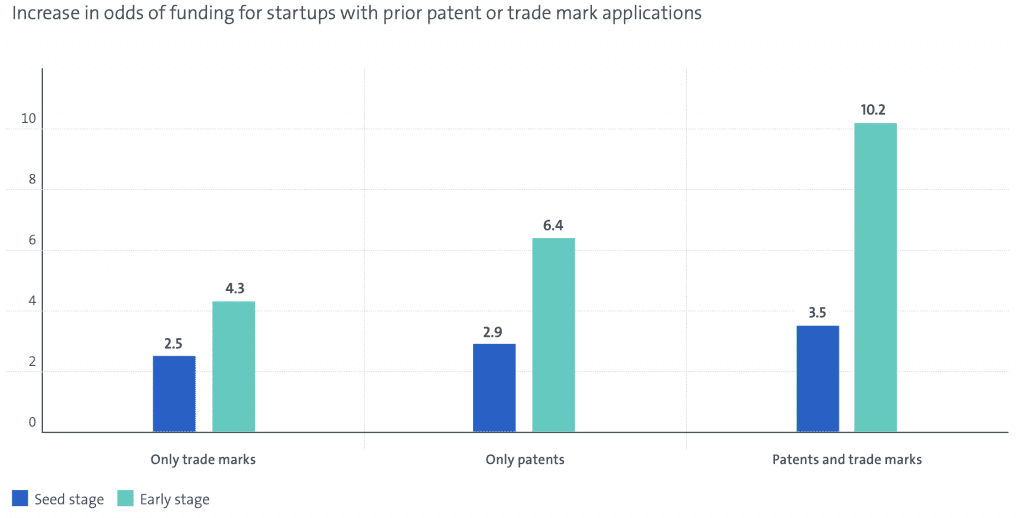What role do trademarks play in the success of early-stage startups? More than might initially meet the eye, according to a new study from the European Patent Office (“EPO”) and the European Union Intellectual Property Office (“EUIPO”), which highlights how much trademarks (and patents) can boost the rate at which European startups are able to raise funds and ultimately, become the targets of M&A. According to the EPO and EUIPO, on average, startups that have amassed both trademarks and patents during their initial seed or early growth stages are more than 10 times more likely to secure funding. The EPO and EUIPO also found that that signaling power of trademarks and patents can serve as a predictor of successful exits, namely, initial public offerings, acquisitions, or buyouts.
At a high level, the EPO and EUIPO state in their “Patents, Trademarks and Startup Finance” report that at all funding stages, startups that have registered intellectual property rights secured greater funding on average than those without. They note, however that there are significant differences among sectors and funding rounds. In the science and engineering sectors, for instance, 38 percent of companies have applied for at least one trademark. Meanwhile healthcare and manufacturing are industries in which 40 percent of companies have respectively registered for either a patent or a trademark.
Other industries that extensively seek to register trademarks – which range from brand names and logos to indicators like colors and the appearance of products – are “sustainability (37 percent), energy (36 percent), artificial intelligence (36 percent), agriculture and farming (36 percent), and natural resources (35 percent).”
On the patent front, the biotechnology sector is followed by science and engineering, manufacturing, health care, artificial intelligence, and data and analytics in terms of the leading share of startups that have amassed at least one patent.

From a regional standpoint, the EPO and EUIPO found that there is “significant variation” in the reliance on intellectual property rights among European countries. Finland and France have the highest percentage of startups with a trademark and/or patent filing at 42 percent each, while startups based in Germany (40 percent), Austria (40 percent), Italy (39 percent), Norway (37 percent), Sweden (34 percent), Denmark (34 percent), Switzerland (32 percent), and Czech Republic (31 percent) similarly apply for more IP rights on average.
Addressing to the impact of such filings from an investment-generating point of view, the two IP bodies report the filing of trademark applications in the seed or early growth stage is associated with a higher likelihood of subsequent venture capital funding. “This effect is particularly important in the early stage, with a 4.3 times higher likelihood of funding for startups that filed for trademarks,” according to the EPO and EUIPO. “Startups that filed for both trademarks and patents show the highest likelihood of funding in both the seed and the early stage.” At the same time, they state that the filing of trademark and/or patent applications is associated with “a more than twice as high likelihood of successful exit for investors.”
The highest likelihood of initial public offering or acquisition, they reported, is observed for startups that filed for both patents and trademarks.
As for the key reasons why portfolios of trademarks and/or patents bring value to startups, in particular, the EPO and EUIPO state that: (1) the monopoly conferred by patents can reduce competitive pressures (improving the profitability of the startup and securing higher returns for investors); (2) patent filings are effective indicators of the technical capabilities of firms and their employees; (3) trademark filings demonstrate that startups are aware of the importance of marketing protection; (4) patents and trademarks will survive as assets in the event of a bankruptcy, providing security for both investors and lenders; (5) IP licensing can provide additional income; (6) patent rights can help enable startups to enter joint research ventures with larger firms, accelerating their own research and development; and (7) startups’ intellectual assets typically greatly outweigh their physical assets, and investing early in securing registered rights can send an important signal to potential investors of otherwise unobservable value in a startup.
Not inconsequential, the EPO and EUIPO state that their findings are “especially relevant today, after the shock of COVID-19 and the recent monetary policy tightening led to a decline in investment in European startups in 2022.” As “reduced venture capital spending and weaker growth forecasts are putting an end to an era of easy access to venture capital,” they argue that “IP rights deserve strong attention as a means not only of capturing the value potential of their intellectual assets but also of signaling this value to investors.”
Trademarks as Broader Indicators of Value
The EPO and EUIPO are not the first to reach the conclusion that trademark filings tend to have a hand in boosting companies’ success. Researchers at UCLA’s Anderson School of Management, for example, revealed in 2021 that companies that receive the most trademark registrations each year (relative to their total assets) “may be delivering an intriguing tell: Their stock performance, on average, is higher in the next 12 months than companies that were not as active with new trademarks.” As such, the UCLA researchers – who used data from more than 300,000 trademark registrations filed with the U.S. Patent and Trademark Office from 1976 to 2014 – determined that “the number of new trademark registrations [amassed by an individual company] positively predicts firm profitability.”
Practically speaking, the researchers discerned that there is “a positive relation” between companies that receive new trademark registrations and their future stock returns in part because of “investor underreaction to future benefits conferred by new trademarks.” (It is worth noting, as the researchers do, that the balance sheets of U.S. firms do not include the value of internally generated IP intangibles, such as patents, trademarks, copyrights, and trade secrets, and instead, the associated costs of creating them (e.g., research and development costs) are expensed on the income statement as they are incurred. As such, “treating expenditures that generate IP internally in the same way as other operating expenses makes it hard for investors to value firms in the current knowledge-based economy, where IP intangibles are important main assets.”)
In other words, investors and analysts, alike, routinely underestimate the promise of higher future profitability that can be gleaned from trademark filings/registrations, which, in turn, results in the undervaluation of companies.
THE BIGGER PICTURE: The value of intellectual property – trademarks, included – is said to be rising. IP “gain[ed] value as the Covid-19 pandemic upend[ed] traditional models for retailers, restaurants, and other businesses,” the Wall Street Journal reported back in August 2020, citing “the recent wave of corporate bankruptcies, [which] shows that IP is one of the most valuable assets a struggling business holds.” Among other things, the Journal stated that retailers’ branding and other IP assets “have become more valuable because of the expedited shift to online shopping due to the pandemic, as shoppers are more likely to support and trust brand names they recognize,” thereby, bolstering the value of the trademarks at play.











